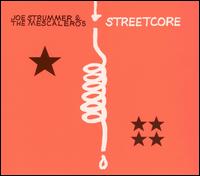
- Format: MP3

Like Muddy Waters, whose final albums were among the best in his catalog, Streetcore by Joe Strummer & the Mescaleros (Martin Slattery, Tymon Dogg, Simon Stanford, and Scott Shields) sends Strummer into rock & roll heaven a roaring, laughing, snarling lion. Unlike the previous Mescaleros outings, which were rooted in various world and folk musics and tempered by rock, Streetcore anchors itself in rock & roll and deadly heavy reggae (and for anyone who needs a reminder, Strummer's former band, the Clash, played reggae in the late '70s and early '80s better than a lot of that genre's artists). From "Coma Girl," the album's opening track, there is no doubt that Strummer hits bedrock with this fusion of garage band wail and dread beat. "Coma Girl" uses lean and mean guitars and Phil Spector's 1960s girl groups, then crosses them rhythmically with rocksteady basslines and enormous backbeats. Yes, it does sound like a lost cut from London Calling. A love song for a wasted mascot who flirts and inspires the various metaphorical socio-politcal gangs that are trying to rule the dawn of the end of the world, Strummer and band — the Mescaleros, with their killer rhythms and over-the-red-line guitar and keyboard lines are as tight and tough as anybody out there — truly find the flowers borne by suicide divas in the dustbin of the apocalypse. Writing like Bob Dylan at his most expressionistic, Strummer's urgency is beyond the warnings of the Clash's London Calling or Sandinista! Strummer's protagonist is living on the nether edge of reality, where the worst has already happened, he can only celebrate what's left in the ahses of civilization.
Listening to the crunchy rocksteady thunder in "Go Down Moses," with its monstrous dubbed-out bass and lyrics about the sellout of the world wholesale, listeners can hear Strummer laughing in the face of all the darkness multinationalism can muster. "Long Shadow," with its minor-key architecture and acoustic guitars played in pure Americana rambling style, was written for Johnny Cash but never recorded. Its protagonist crosses deserts and rivers; he haunts the places of desolation in order to speak with the voice of the Storyteller. The song's style and spirit evokes the ghost of Cisco Houston as Strummer sings: "I'll tell you one thing that I know/You don't face your demons down, you gotta grapple with 'em Jack/And pin 'em to the ground...And I hear punks talk of anarchy/I hear hobos on the railroads/I hear mutterings on the chain gangs/It was those men who built the roads/And if you put it all together/You didn't even once relent/You cast a long shadow/And that is your testament...." Other rockers include the burning revolution drama of "Arms Aloft," with a refrain that is among the most anthemic and raucous Strummer ever wrote. With wah-wah guitars, distorted bass, boombastic drums and cymbals, it is the hardest rocking track on the set. Also strong are the searing "All in a Day," with its razor-wire Telecaster stomp, and the medium to slow heaviness of "Burnin' Streets." There are two covers on Streetcore. First is a deeply moving reading of Bob Marley's "Redemption Song," played acoustically by Strummer, Smokey Hormel, and Benmont Tench, and produced by Rick Rubin. This is the only cut that the Mescaleros don't appear on; it wasn't recorded for this set but is included by Luce (Strummer's widow) and the band as a hinge piece for the front and back of the album to hang on, and it works gloriously. The other is the closer, a cover of the Bobby Charles' classic "Before I Grow Too Old," retitled here as "Silver and Gold." It's a barroom song played in elegiac, Anglo country style — think of the Mekons on Fear and Whiskey. Strummer's last line in the song is, "I've got to hurry up before I grow too old," before he speaks to us in his grainy Cockney voice, "OK, that's a take." It's almost as unbearable as it is unforgettable. Streetcore is the sound of Joe Strummer hitting his stride with his own band on his terms both lyrically and musically. The fact that this is a final album for Strummer is beside the point; this is one of the best rock & roll albums of 2003, and truly the finest, most cohesive work he did after London Calling.